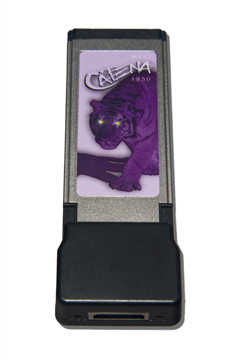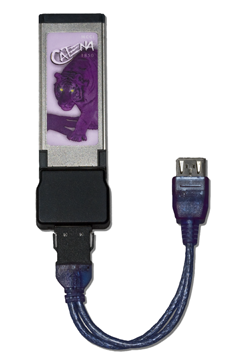Catena 1850
HS On-The-Go USB Development Platform
 The MCCI Catena® 1850 gives firmware developers everything needed to prototype high-speed USB embedded host, device, dual-role and On-The-Go (OTG) products in Microsoft Visual C, while working on a Windows system.
The MCCI Catena® 1850 gives firmware developers everything needed to prototype high-speed USB embedded host, device, dual-role and On-The-Go (OTG) products in Microsoft Visual C, while working on a Windows system.
The Catena 1850 combines a 32-bit ExpressCard interface with an NXP ISP1761 (compatible with the NXP SAF1761BE) Hi-Speed USB Host Controller and Peripheral Controller chip and a low-level driver for Windows (32-bit or 64-bit, XP through Windows 10). This controller is memory mapped through the Windows ExpressCard Root Port. The Catena 1850 allows developers to write register-level code that accesses the ISP1761 just as it would in a target system. Code can then be recompiled and used unchanged on a target embedded system.
The Catena 1850 is ideal for use in early prototyping and proof of concept, development of device class drivers for an embedded host stack, and for evaluating USB system architectural concepts before product hardware is available.
Software can be developed in a number of “operating system” environments:
- MCCI USB DataPump® portable firmware environment and “os/w32” – this binding for the DataPump simulates an embedded system in the Windows environment. Developed code can be recompiled and directly ported to development platforms.
- MCCI USB DataPump environment combined with Enea’s OSE Windows-based simulator. Code developed in this environment can directly port to OSE-based targets.
- Custom environments — readily supported through an abstraction layer.
Code developed with the MCCI Catena runs as a Windows application, and is debugged using standard debugging tools, including the Visual Studio environment.
In addition to supporting OTG development, the Catena 1850 can be used for developing embedded USB device firmware, embedded USB host stacks, or a combination (USB embedded host for embedded peripherals, plus OTG functionality for system expansion). MCCI® supplies five different cable adapters:
- OTG mini A/B (for OTG dual role device emulation)
- Mini B (for OTG or standard USB device emulation)
- OTG mini A/B plus standard USB A receptacle (emulates OTG dual role device plus embedded USB host)
- Mini B plus standard USB A receptacle (emulates USB device plus embedded USB host)
- Dual A receptacle (emulates dual USB host)
Code developed with the MCCI USB DataPump can readily use the ISP1761 to simulate  silicon that is under development or not yet available. The silicon independent DataPump architecture allows the underlying silicon to be replaced with no effect on the higher level firmware developed earlier in a project.
silicon that is under development or not yet available. The silicon independent DataPump architecture allows the underlying silicon to be replaced with no effect on the higher level firmware developed earlier in a project.
The Catena 1850 is packaged in a PCMCIA 34mm ExpressCard form factor.
Related MCCI products include:
- TrueTask® Dual-Role USB stack, for USB Type-C™ and OTG applications
- TrueTask USB Host Stack, for embedded host support
- MCCI USB DataPump® portable USB device firmware environment
- MCCI USB Class Drivers, for Windows, MacOS, Linux and embedded systems
Specifications:
MCCI Catena 1850
| USB Silicon | NXP ISP1761 High-Speed USB On-The-Go controller (compatible with NXP SAF1761BE automotive On-The-Go controller) |
| PCIx Bridge Silicon | PLX PEX8311 PCI Express-to-Generic Local Bus Bridge |
| Device Endpoints | Seven IN endpoints, seven OUT endpoints and one fixed control IN and OUT endpoint |
| Interrupts | All interrupts multiplexed onto a single IRQ. All interrupt handling is performed by the Windows 32 application, with minimal kernel overhead |
| Register-Alignment | ISP1761 registers are aligned on 2-byte boundaries in Memory space |
| Operating Modes | OTG Dual Role; USB Device; Dual USB host; USB host + OTG dual role; USB host + USB device |
| Operating Mode Configuration | Automatic, based on the cable adapter plugged in |
| Miscellaneous | Each Catena 1850 is assigned four Ethernet MAC addresses, using MCCI’s OUI. Addresses are accessed by reading the PCMCIA Card Information Structure (CIS) |
Development System Requirements
| Development System Operating System | Windows 7 through Windows 10, 32-bit and 64-bit |
| Virtual Machine Support | Because PCIe ExpressCards are normally not virtualized well, the 1820 normally cannot be accessed from a guest operating system. |
| Expansion Slot | 34mm ExpressCard |
| C Compiler | Visual Studio 2008 through Visual Studio 2015 |
About
For over twenty years we've been developing and licensing USB system software to be embedded into our customers’ consumer-electronics products.
Contact
Use our contact page to connect with us. We will work with you to meet your needs.
Updates
Stay up to date with our work and get updates delivered right to your inbox.
